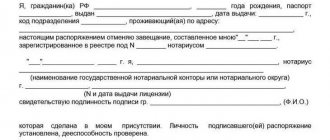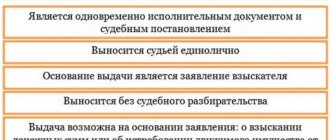If you are going to give someone a power of attorney, it is better to inquire in advance about the ways in which you can revoke it if the need arises. Depending on the type of power of attorney issued, the legal nuances of this procedure also depend.
How to cancel the granted right to act on your own behalf, while remaining within the law, protecting yourself from possible complications? More on this below.
How to cancel a power of attorney issued on behalf of an organization ?
Do you need a reason?
The power of attorney has such a name because it is designed for a certain amount of trust of both parties in each other. If an individual or company entrusts someone to act in its place for any authorized action, it has the right to terminate this opportunity at any time.
Question: Does an organization have the right to revoke an irrevocable power of attorney by sending a revocation that is not notarized? View answer
There can be many reasons for this, for example:
- loss of trust
- termination of contractual relations,
- termination of contract, etc.
But the principal is not obliged to voice them either to the notary or to his representative, since the granting of powers from the point of view of the law is a one-sided transaction.
How to cancel the power of attorney of the head of the branch ?
To terminate a power of attorney, the expressed will of the person who issued it is sufficient and the procedure is carried out completely according to the law - in accordance with Art. 188, 189 of the Civil Code of the Russian Federation.
REFERENCE! The procedure for revoking a power of attorney is enshrined in clause 10 of the Methodological Recommendations for Certifying Powers of Attorney, approved by the decision of the Federal Notary Chamber of July 7-08, 2003, Protocol No. 03/03.
How to check a power of attorney issued by a notary?
If you had to make some kind of transaction, and one party is represented by a trustee, it becomes necessary to check the document for authenticity. Such verification can be carried out by strictly defined groups of persons:
- persons involved in the preparation of documents at the notary
- legal representatives in whose name the document is issued
- representatives of investigative and judicial authorities
- bailiffs, if the information is necessary in connection with their professional duties
- notaries
Since 2021, at the Federal Chamber of Notaries, you can check the authenticity of a power of attorney online. There is a single register that allows you to verify the authenticity of any document. There is even information about powers of attorney that have already been revoked. Your actions:
Procedure for revoking a power of attorney
IMPORTANT! Recommendations for drawing up a notice of revocation of a power of attorney from ConsultantPlus are available here
It would be more correct to call such an action not “revocation of a power of attorney,” but “cancellation of authority.” Since the result of such an action will be precisely the termination of the representation.
To complete this procedure, you cannot do without a notary who certified the issued power of attorney. What needs to be done by the principal who wishes to cancel this document:
- write a statement in which you notify the notary of your will to terminate the power of attorney;
- decide on who will notify the representative about the termination of his right - you yourself or a notary;
- if you decide to use the help of a notary to notify a representative, the representative of the law himself will send out official notices;
- after the notary has sent the notices, he will provide you with evidence that the notice was served;
- it is necessary to notify not only the representative, but also all possible “addressees” who were supposed to be presented with a power of attorney to act on behalf of the guarantor;
- a note on the revocation of the power of attorney in a special notary register (made by a notary);
- the power of attorney is returned by the recipient to the person who issued it.
IMPORTANT! If it is impossible to accurately determine the scope of the possible validity of the power of attorney or it is too broad, that is, targeted notification of third parties is impossible, you need to notify them through the media.
To do this, you need to place the relevant information in the Kommersant newspaper. This does not cancel the obligation to personally notify the guarantor himself.
Revocation of a notarized power of attorney
In order to revoke a notarized power of attorney, you will need to contact a notary directly, who:
- revokes the power of attorney in the register of notarial acts;
- will send notices to the authorities, authorities and institutions for representation in which the power of attorney was issued, for example, to the courts, the tax office, etc.
Revoking a notarized power of attorney is a paid service from a lawyer, the cost of which depends on whether you contact a private notary or a public notary.
Responsibility of the principal
Notification of all persons affected by the revoked power of attorney is a mandatory element of this procedure for the principal. If this condition is not met, unpleasant consequences are possible.
Sending notices of termination of the powers of the guarantor is, by law, the obligation of the principal, and not his right.
If the representative of the revoked license performs on behalf of the principal any actions for which he no longer has the right, and third parties have not received notification of this (in writing or through the media), then they will not bear any responsibility for all the consequences of the actions taken.
Everything that the guarantor does will be the personal responsibility of the principal who neglected his duties, including possible illegal actions, for which the person who issued the power of attorney will also have to answer.
In addition, if the principal violated the notification regime, and the guarantor. Without knowing anything about the revocation of the power of attorney, he performed some actions within the framework of the previously granted powers and at the same time incurred certain expenses, the principal is obliged to reimburse them in full.
What to do if unwanted actions were still committed?
In the event that the authorized person whose powers you want to revoke has nevertheless managed to perform actions under the revoked power of attorney, the only option left is the court. The notary issues a document that confirms the exact date and time of revocation of authority. Accordingly, by going to court, you can prove that at the time of performing the actions the person no longer had authority, and therefore all his actions will be declared void by the court. You can safely go to court, since existing judicial practice shows that courts are very willing to issue decisions on the nullity of transactions based on dubious powers of attorney.
Guarantor and return of power of attorney
The refusal of the guarantor, notified of the cancellation of the power of attorney, to return it to the principal is a reason to contact law enforcement agencies: legally, this can be regarded as an attempt at fraud. You can first draw up an act of refusal to return the power of attorney and make a note on it about the guarantor’s refusal to sign it, if it follows. Signatures of witnesses to this action will be required.
What if the representative disappears? In cases where the representative avoids contact and his whereabouts are unknown, it would be legally correct to send a notice of revocation of the power of attorney to any of the addresses previously specified by him, making sure to keep the delivery notice. From the point of view of the law, it will be considered received.
FOR YOUR INFORMATION! Third parties are not obliged to verify the good faith of the guarantor and the validity of the power of attorney. All responsibility lies with the principal.
Results
Thus, the answer to the question: how to revoke a power of attorney is quite simple - you need to carry out one of the legally significant actions suggested above, and notify the attorney and interested third parties about the revocation of the document. If you carry out the procedure in accordance with the recommendations given in the article, negative consequences caused by incorrect actions can be avoided.
Sources:
- https://law03.ru/society/article/kak-annulirovat-doverennost
- https://doverenost.com/kak-annulirovat-otmenit-doverennost/
- https://www.rosnotarius.ru/kak-otozvat-doverennost-udostoverennuyu-notariusom
- https://doverennost.net/kak-annulirovat/
- https://zen.yandex.ru/media/katsaylidi/kak-otozvat-doverennost-5afd09a0482677e18f6aee83
- https://nalog-nalog.ru/spravochnaya_informaciya/kak-otozvat-udostoverennuyu-notariusom-doverennost/
- https://gosuchetnik.ru/bukhgalteriya/instruktsiya-kak-otozvat-vydannuyu-doverennost
What if the power of attorney was not certified by a notary?
The law allows the drawing up of a power of attorney in simple written form. Revocation of such a power of attorney is simpler, since it only involves sending a written notice to the guarantor about the termination of his powers, after which the trust document must return to the person who issued it. In order to protect yourself from possible risks, it is better to take care of confirmation of receipt of this notification in advance: the easiest way is to send a postal item with acknowledgment of receipt or ask the recipient for a receipt.
Subtleties of revoking authority
In practice, there are many different nuances that persons who issued a power of attorney may encounter. Let's try to look at the most common cases and give recommendations on effective and legally correct actions.
- A power of attorney has been issued to several persons, but only one or some of the powers need to be revoked. In such a sensitive situation, notifications must be sent to all persons specified in the power of attorney, as well as to the circle for which it is intended. The text of the notification must clearly indicate whose powers are being abolished. In this case, it does not matter whether all the representatives named in the document acted together or separately: the rights remain only with those remaining.
- Limitation of powers. If you do not want to completely terminate the power of attorney, but cancel only certain powers, then the notice must describe in detail which actions the guarantor no longer has the right to do and which remain in force. When rights are limited, the guarantor does not return the power of attorney, and there is a risk that he will want to use the full scope of representation. Therefore, it is recommended to cancel the power of attorney completely. And then issue the representative a new one - with a limited range of powers.
- Cancellation of reassignment. The law allows the guarantor, in turn, to issue a power of attorney to someone else, while the first principal may not know either about this fact or about the identity of the guarantor. If the primary principal does not want to allow this, he must revoke this authority by informing the guarantor in the prescribed manner. If the power of attorney is canceled by the primary principal, the right of sub-authorization is automatically lost, which the principal must inform not only the guarantor, but also the sub-guarantor. If the subguarantor is unknown to the primary guarantor, responsibility for notifying him falls on the person who issued the right of subrogation. If the substitute (guarantor) has not received such notification, the law protects his conscientious actions - according to paragraph 2 of Article 189 of the Civil Code of the Russian Federation, if he presented to third parties a power of attorney, the cancellation of which they were not notified, the principal is obliged to recognize the rights and obligations.
- Cancellation of a power of attorney for an employee. If an organization has issued a power of attorney to its employee and wishes to revoke it, it is first necessary to issue an internal order with which the deprived guarantor is familiarized with the visa. It is also necessary to act if the guarantor employee resigns.
- The company that issued the power of attorney is liquidated. In this case, the validity of all powers of attorney is terminated by itself. The counterparties will receive notifications in the order of liquidation of the enterprise.
- Other grounds for termination of a power of attorney that do not require its revocation are expiration of the term, death of the principal or guarantor, as well as other cases provided for in Article 188 of the Civil Code of the Russian Federation.
When a power of attorney cannot be revoked
There are situations provided for by the law of the Russian Federation when it is impossible to revoke a power of attorney before the expiration of its validity period or the occurrence of the circumstances referred to in it. This is the so-called “ irrevocable power of attorney ”, the preparation of which is provided for in Art. 188.1 of the Civil Code of the Russian Federation. It is drawn up exclusively in notarial form and does not provide for the right of subrogation. The wording of an irrevocable power of attorney differs from the usual one in only one point - the prohibition of cancellation before the expiration of the term or the occurrence of specified events.
Such a document is more risky for the principal than the usual form of power of attorney, so it is concluded for one-time legal relations or transactions with very clearly defined boundaries of conditions.
Early termination of an irrevocable power of attorney is possible only for special, exceptional reasons provided for in legislative acts, namely:
- its goal has been achieved or it is clear that it will never be achieved for objective reasons;
- the principal or guarantor has died;
- the principal has evidence that the guarantor is abusing or is likely to abuse the powers under this power of attorney;
- according to the conditions that were specified in the document itself.
It cannot be said that the annulment of an “irrevocable” power of attorney is absolutely impossible; it would be more accurate to state that its procedure is more difficult compared to the usual form of a power of attorney.








